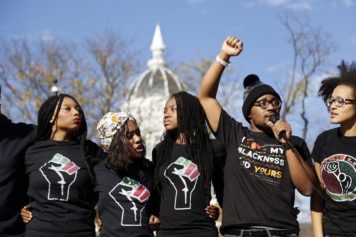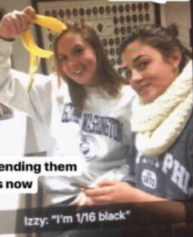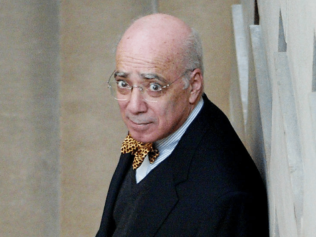There is a burgeoning student protest movement erupting across the country, perhaps one which the nation has not witnessed since the anti-apartheid activism of the 1980s, much less the Black Power and antiwar campus demonstrations of the 1960s.
Just two days after thousands of fast-food workers hit the streets across the nation to demand a $15-an-hour wage and union rights for that sector, college students across the U.S. marched at over 120 campuses in at least 100 cities for the cause of free tuition for public college and the cancellation of student loan debt.
As Reuters reported, the protests were called the #MillionStudentMarch, and was trending on Twitter. To understand the scope of the issue, student loan debt has become a major national problem addressed by a number of presidential candidates, as total U.S. student loan debt has doubled to $1.2 trillion, according to the U.S. Consumer Financial Protection Bureau.
With an anemic economy and job market, student loan debt can cost an individual hundreds of thousands of dollars, amounting to a mortgage and forcing some young Americans to forego or postpone purchasing a house and starting a family. While public colleges often were free in decades past, providing an accessible education to working class students and students of color, these days some students are forced to postpone or cancel their studies due to the exorbitant tuition fees and expenses.
In an example of how the #MillionStudentMarch and #BlackLivesMatter movements are gaining strength from each other, student debt protesters broadened their message to show solidarity with the University of Missouri students who are fighting against racial injustice on their campus, and a climate of racial hostility and terrorism. Students in the Boston area convened on Northeastern University, where they held signs reading “Degrees not receipts” and “Is this a school or a corporation?” Protesting students in New York also marched for higher pay for campus workers, and railed against the militarization of campus security.
“Education is a right, not just for the rich and white,” protesters chanted at Hunter College in New York, as reported by Newsweek.
“As youth from working class communities, we witness the attacks the ruling class wages against our people,” the Revolutionary Student Coordinating Committee at the City University of New York said in a statement. “Our educational opportunities are being squashed… because the university does not work to serve our communities but instead invests in private prisons, militarizes our campuses and locks most of us out of education by raising tuition and cutting programs that benefit working class students.”
#MillionStudentMarch: Students walk out of class over tuition costs [VIDEO] https://t.co/Cf1hEEWOsN @egorpiskunov_RT @Brigida__Santos
— Ahmet Kaan Alp (@ahmetkaanalp) November 13, 2015
FREE CUNY!! #CCNY #MillionStudentMarch #Liber8CUNY @nyc_swb pic.twitter.com/zlpZNTvrGO
— RSCCNYC (@rsccnyc) November 12, 2015
Hundreds of Drexel, Temple, & Penn students now gathered at City Hall for #MillionStudentMarch. @FOX29philly pic.twitter.com/xRk9i7aTOI
— Andrew Adamson (@AndrewDAdamson) November 12, 2015
Join students, faculty & #nurses across the country Nov 12th, for the #MillionStudentMarch https://t.co/co1ElaNdYN pic.twitter.com/tVcfyskIh8
— NationalNursesUnited (@NationalNurses) November 11, 2015
The Thursday protests came as students at Ithaca College in upstate New York protested racism at their institution and called for the resignation of college president Tom Rochon.
“Diversity and inclusion here at Ithaca College is nothing more than an image,” one protester said, according to the Ithaca Journal.
Meanwhile, Mary Spellman, the dean of students of Claremont McKenna College resigned after sparking campus protests and a hunger strike by two students, as the Los Angeles Times reports. Spellman came under fire for not supporting students of marginalized identities. At Loyola University Chicago, hundreds of students demonstrated against racism, shouting, “You can’t stop the revolution!”
“Systemic racism is definitely true and present at this university,” said Dominick Hall, a junior at Loyola.
“I shouldn’t have a hard time learning in class because my teacher is targeting me while she’s speaking about the Black Lives Matter Movement. That makes no sense. She wouldn’t look at my white counterparts that way – why would she look at me that way?” said Heather Afriyie, a senior. “A majority of the students are being targeted in class because of what color they are, what race they are.”
“It’s a tough time to be a young person in the United States today, particularly a young person of color,” David Menefee-Libey, a Pomona College politics professor, told the Los Angeles Times, arguing the national protests are giving voice to the challenges facing young people. “Economic opportunities are constrained. Access to higher education is constrained. Interactions with public authorities are fraught, especially interactions with police.”
As Democratic presidential candidates have offered proposals to address racial justice and college debt, a number of Republican presidential candidates have reacted negatively to the nationwide campus protests. Ben Carson, a graduate of Yale University, which has been embroiled in protests against racism, told Fox News that the country is becoming too “tolerant by…[accepting] infantile behavior.” Chris Christie called the demonstrations “a product of the president’s own unwillingness and inability to bring people together,” according to Think Progress.
“The lawlessness that the president has allowed to exist in this country just absolutely strips people of hope,” Christie added. “Our administration would stand for the idea that justice is not just a word, but it’s a way of life. Laws will be applied evenly, fairly, and without bias to everyone.”
Donald Trump called the University of Missouri protesters “crazy.”
“I think it’s just disgusting. I think the two people who resigned are weak, ineffective people,” Trump said on Fox News Thursday morning. “When they resigned, they set something in motion that’s going to be a disaster for the next long period of time.”



